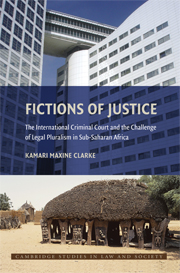 Fictions of Justice
Fictions of Justice Published online by Cambridge University Press: 23 January 2010
The case against Thomas Lubanga Dyilo was the first to be brought before the International Criminal Court (ICC) Pre-Trial Chamber. It also marks the first time an individual engaged in noninternational crimes was brought before an international court solely on the basis of those acts. What were his noninternational crimes? On August 28, 2006, the Office of the Prosecutor of the ICC filed a document containing the charges against Lubanga Dyilo. It outlined three counts of war crimes charges, under the Rome Statute, for which he was being held:
Count 1: CONSCRIPTING CHILDREN INTO ARMED GROUPS, a WAR CRIME, punishable under Articles 8(2)(e)(vii) and 25(3)(a) of the Rome Statute.
Count 2: ENLISTING CHILDREN INTO ARMED GROUPS, a WAR CRIME, punishable under Articles 8(2)(e)(vii) and 25(3)(a) of the Rome Statute.
Count 3: USING CHILDREN TO PARTICIPATE ACTIVELY IN HOSTILITIES, a WAR CRIME, punishable under Articles 8(2)(e)(vii) and 25(3)(a) of the Rome Statute.
According to the evidence, Lubanga Dyilo did not personally conscript children into the rebel war. Instead, at the time the crimes were committed, he was acting as president of the Union des Patriotes Congolais (UPC) and the commander-in-chief of its former military wing, the Forces Patriotiques pour la Libération du Congo (FPLC). When the ICC's jurisdiction began, and throughout 2003, FPLC commanders were enlisting, forcibly recruiting, and abducting children into the ranks of the FPLC, using them to participate actively in hostilities in the Ituri district of the Democratic Republic of the Congo (DRC).
To save this book to your Kindle, first ensure [email protected] is added to your Approved Personal Document E-mail List under your Personal Document Settings on the Manage Your Content and Devices page of your Amazon account. Then enter the ‘name’ part of your Kindle email address below. Find out more about saving to your Kindle.
Note you can select to save to either the @free.kindle.com or @kindle.com variations. ‘@free.kindle.com’ emails are free but can only be saved to your device when it is connected to wi-fi. ‘@kindle.com’ emails can be delivered even when you are not connected to wi-fi, but note that service fees apply.
Find out more about the Kindle Personal Document Service.
To save content items to your account, please confirm that you agree to abide by our usage policies. If this is the first time you use this feature, you will be asked to authorise Cambridge Core to connect with your account. Find out more about saving content to Dropbox.
To save content items to your account, please confirm that you agree to abide by our usage policies. If this is the first time you use this feature, you will be asked to authorise Cambridge Core to connect with your account. Find out more about saving content to Google Drive.